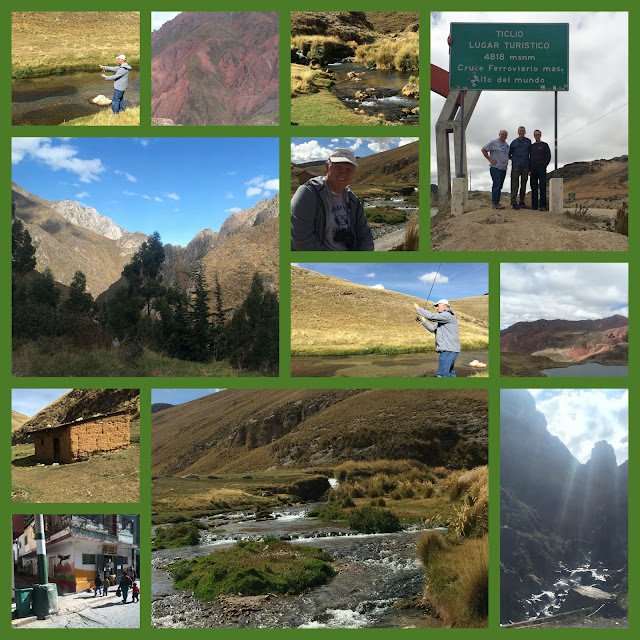Look carefully at this road to the highlands of northern Peru to some of the back country villages. Yeah, this is where our humanitarian missionaries go for the weekend! We love to hear their stories over lunch after they return. These villages are self-sustaining and independent from rest of the world. They welcome help and supplies when they come from afar.
These road photos are
on the “highway” Huarmey, Ancash to check out the condition of the school desks
and equipment in four small communities there to verify the need.
Education

The computers were donated by the church to help people become more prepared for a college education. This picture is in a
community facility operated by the Lima Metropolitan government that provides
skills training in a very poor neighborhood of Lima known as San Gabriel Alto.
This facility is a "Productive Workshop" that is designed to
help people learn productive skills to become more economically independent.
The workshop is located in the center of this
neighborhood and courses are taught in sewing, cooking, cosmetology, and
computers. We learned of numerous success stories of individuals who used
the basic skills they learned here in order to improve their economic prospects
and gain the abilities necessary to be able to be employed or to actually begin
their own businesses. Brother and Sister Prince are also very involved here with classes twice a week in ESL (English as a Second Language) as a 6-month pilot program to prepare members for Pathway.
Peru has implemented a program called PLAN SELVA (selva means jungle) to help with the school drop-out rate in the little villages along the Amazon. The Church helps in the construction of modules that are made of structural steel and wood and can be transferred to areas in the jungle. Attention is given to needs of each area replacing an entire school or improve only part of it, such as classrooms, restrooms, a multipurpose room, media room, covered patio with updated furniture and equipment.. The floors are high to protect them from heavy rains and flooding and the buildings have improved ventilation and lighting
The children were delighted and the whole town came out for the celebration with dancing, singing and lots of Peruvian food. Mary said she was very skeptical of what she was eating but had to be polite as the guests of honor in their little village. In addition to the new desks, supplies were donated to equip a medical health post in several of the schools of which there was only a Band-aid box available before.
The village parents covered these desks to protect them from further damage and make the surfaces more useable. The children wear hats, sweaters, coats, and scarves inside the classroom. It gets (stays?) cold here much of the year and there did not appear to be any form of heating in the classrooms. Children are clean and attractive and were very curious to see some visitors from North America. A few classrooms had children who extended a greeting to us in English. :-)
Medical
I
n the Amazon region of Peru, a large workshop was held where many medical people attended from all through the region with the idea they will return to their villages and pass on the knowledge. Instruction was given for new baby resuscitation since it is a major problem for death of newborns. At one of the regional hospitals along the Amazon, donated ultra sound equipment was celebrated in the care of maternity and intestinal care. Pictured below is the
first ultrasound machine: The
Health Post in Huacaybamba with the Ultra Sound machine which was donated to
them. They have been able to use it to detect problems in unborn babies early
enough for them to be sent to the city to be treated. In the past, they
couldn't tell if there there problems until birth and then it was too late many
times to get the needed help since the Hospital is over 6 hours away on very
bumpy roads. So much we take for grated in the U.S.

Wheelchairs
There was a training workshop held for repair and rehabilitation of wheelchairs where many new wheels and fabric for seats and backs were donated. Everyone who attended the workshop left with a kit with the proper tools needed for the wheelchair repairs. Men came from all over Peru to be trained so they could be of service in their respective areas. There are 67,000 chairs donated annual by the church, and although we don't distribute the wheelchairs, the Church trains and donates parts. The wheelchairs help in the self-reliance area to help in obtaining employment or attend school. Handicap people came with their old wheelchairs to be repaired and left with them like new again.

Other dimensions of the humanitarian effort here in Peru are to help with clean water wells. When the water is found, the church donates the pump and pipes to bring the water to the surface in a central location for the residents of the little villiages.
In the way of vision care, the church provides cataract surgery training and has donated 4000 reading glasses for school children in addition to vision screening.
There is training for more efficient food production by the stakes in planting gardens and caring of small animals. They learn about container gardening, pesticides and fertilizers with donated seeds and wire screening from the U.S. In northern Peru Piura, the Church carried out a mosquito abatement program.
If you are interested in donating to help with projects such as these, simply make the contribution under "Humanitarian" on the church donation slip or make an online donation at LDS Charities.




































